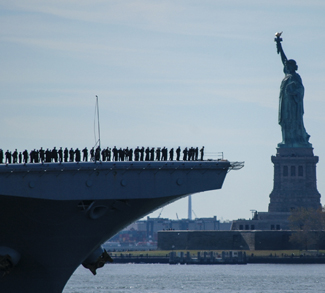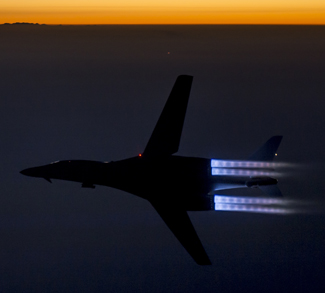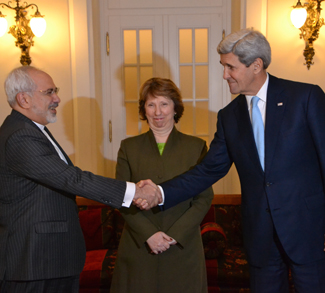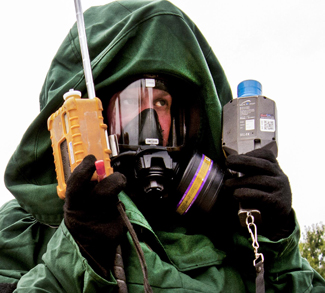With Donald Trump slated to take over the reins from Barack Obama in January 2017, the still incumbent president embarked on his final visit to Europe. On his first stop in Greece, Obama expressed his opinion that Trump would in fact stick with NATO, despite the fact that the president-elect had threatened to abandon the alliance over unfulfilled financial contributions. But no matter how much hope Obama tries to instill on this side of the Atlantic, Trump’s wild cognitive dissonance, lack of experience and transactional worldview could deal the death blow to an already embattled and weakened NATO.
As things stand, Trump’s official policy towards NATO can be found on his Twitter feed: NATO is “obsolete” and “disproportionately too expensive (and unfair) for the U.S.” because alliance members fail to “PAY THEIR BILLS”. It’s true that many major NATO countries such as France and Germany have repeatedly failed to spend the 2 percent of GDP on defense as stipulated by NATO guidelines, and only Greece, the UK, Estonia and Poland met the target. But the president-elect’s demand that European allies pay their fair share goes beyond the mere adherence to NATO’s spending guidelines. What Trump is really demanding is for Europe to pay a significant share of Washington’s own defense spending by covering the costs associated with maintaining American bases and troops in Europe.
The defense plan allows the EU to send “rapid response forces” abroad for the very first time, improving civilian response to non-conventional threats (such as terrorism and organized crime) and invest more funds into developing European drones and fighter jets.
And while this demand might sound sensible to an accountant’s mind, simply looking at defense spending misses the greater picture that has been underpinning US-European relations for decades: Europe’s contributions are worth a lot more than financial statements would reveal. NATO members are a central pillar upholding US global leadership. The Western security alliance bundles two-thirds of global GDP and two-thirds of global military spending, a testimony to the degree of commitment to each other’s safety, unprecedented in world history. But by calling America’s alliances into question, Trump did not stand up for fiscal fairness – he articulated his conviction that the US has no inherent strategic self-interest in Europe.
This is not to say that NATO is a perfect organization and Trump is unnecessarily rocking the boat. The true test of the organization’s continued existence won’t be found in the size of defense budgets. Instead, the organization needs a renewed purpose other than the Cold War era relic of perpetually countering Russia. In its current form, NATO is poorly equipped to deal with asymmetric threats (such as terrorism or cyberthreats) or to deploy humanitarian missions. When European defense ministers met for the very first time after Trump’s election, the main topic was not how to cobble together more cash for the military, but to sign a EU-wide defense plan. German Defense Minister Ursula von der Leyen talked about “building a common security and defense organization” which could, for example, stem the refugee flow by stabilizing African and Middle East countries.
The defense plan allows the EU to send “rapid response forces” abroad for the very first time, improving civilian response to non-conventional threats (such as terrorism and organized crime) and invest more funds into developing European drones and fighter jets. A seldom-mentioned institution, the European Defense Agency, is expected to assume a wider-mandate and oversee the public procurement effort for defense materials. And while EU leaders went out of their way to stress that NATO remains the “centerpiece” of European security, the renewed push is a painful reminder of the transatlantic organization’s shortfalls.
Secondly, Trump’s attacks on NATO unfold at a time when the organization is trying to integrate its newest members and temper their unruly tendencies. Much like the EU, NATO has grown rapidly since the late 1990s, adding 12 more members from the former Soviet bloc. But that breakneck expansion left some officials red-faced. Albania, who joined in 2009, is one of Europe’s biggest producers of marijuana as well as a major safe haven for the heroin and cocaine trade across the continent. Organized crime is rife, as the country has one of the highest rates of illegal gun ownership in the world, a fact that even sparked the interest of ISIS. The Caliphate has been aggressively recruiting followers in Albania and there are even unconfirmed reports of ISIS training camps operational on the Kosovar side of the border.
Similarly, Montenegro, which was invited to join NATO but has yet to ratify, has made headlines after long-time president Milo Djukanovic failed to win an outright majority following the country’s October elections and stepped down – but not before accusing Russian nationalists of plotting a coup. Fears are now running high that NATO could be drawn into a conflict with Moscow over the fate of the former Yugoslav republic. The only problem with that assessment is that Djukanovic, in power since the early 1990s, has a long history of cronyism and is perhaps the only head of state to battle accusations of creating an international cigarette smuggling empire in partnership with the Italian mafia. It’s not surprising that some analysts have argued that the coup could have easily been organized to ensure Djukanovic wins the election – and they have even pointed to a close associate, Radoitza Rajo Bozovic, as the main organizer.
Given Djukanovic’s own propensity for criminal activity and Albania’s burgeoning drug empire, it’s no surprise that security experts argue that it is nonsensical to extend the US nuclear umbrella to countries with a long history of corruption that could bring about major conflict. It is clear that NATO will have to reform, but Trump’s transactional worldview fails to grasp the real scale of the challenge. The US has itself benefited tremendously from the alliance’s “absolutely unconditioned” activities in the fight against terrorism, but Donald Trump’s outlook on European defense is throwing all support out of the window.
The opinions, beliefs, and viewpoints expressed by the authors are theirs alone and don’t reflect any official position of Geopoliticalmonitor.com.




